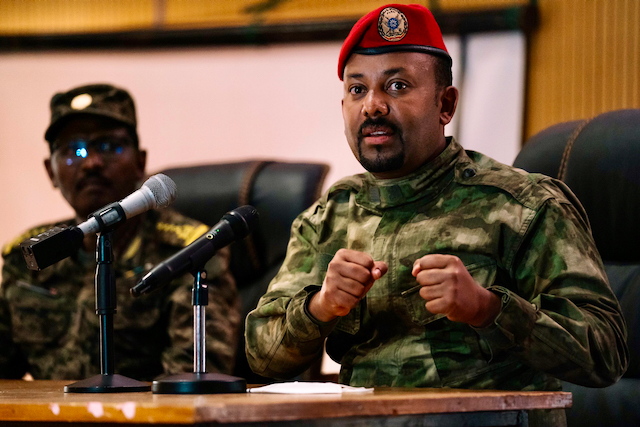Lamis Elsharqawy, Thursday 2 Sep 2021
Ethiopian Prime Minister Abiy Ahmed visited Uganda and Rwanda following regional calls for mediation in order to bring the warring parties in Tigray to the negotiating table. Seeking regional supporters, he had already visited Turkey, South Sudan and Eritrea.
“It is not hard to see why he made this hurried trip: support from the rest of Africa has been eroding as the Tigray war gets bloodier,” said Martin Plaut, a senior research fellow at King’s College London. “The Ethiopian leader’s shuttle diplomacy around the region is an indication of just how concerned the prime minister is about his increasing isolation inside Africa. He has previously alienated Egypt and Sudan over the use of the Nile’s waters. Now other African neighbours are fearful that the Tigray war will destabilise the Horn. Prime Minister Abiy is attempting to shore up his support. This is an indication of weakness, not strength.”
Ethiopia admitted in March that Eritrea was aiding its own troops in the war on Tigray. The foreign forces began withdrawal weeks after this announcement but there are reports indicating that the troops are returning to Tigray on the request by Addis Ababa. The US and the European Union warned of an escalation of fighting over the return of the Eritrean forces to Tigray, where Addis Ababa is fighting against the Tigray People’s Liberation Front (TPLF), an organisation it identifies as a terrorist group.
Both Uganda and Rwanda faced civil wars against militant groups and minorities, and those conflicts led to the killing of thousands of people in situations similar to what is happening now in Tigray, which has spread to the regions of Amhara and Afar as well.
The UN recently described the humanitarian situation in Ethiopia as “a catastrophe”, calling for an immediate ceasefire and the launch of national political dialogue. Tigray faces a humanitarian blockade and is cut off from electricity and communications, with more than two million people displaced and millions more are in immediate need of food, water, shelter and health care. The UN stated that at least 400,000 people are living in famine-like conditions.
With Abiy Ahmed increasingly at loggerheads with Western countries such as the US, UK and Germany, who have demanded to hold an immediate dialogue with the TPLF, Ethiopia seeks support from neighbouring countries. But Jan Abbink, a senior researcher at the African Studies Centre Leiden, said the African countries showed “indifference and divisions” in helping to get a solution for the crisis in Tigray. “They submit too much to the Western misconceived interpretations and actions of this conflict.”
Ethiopia isn’t only resorting to formation of strategic partnerships with African neighbours but also with countries like Turkey who already has huge interests in the country. According to official reports, Turkey, which invests heavily in the textile sector, is the second-largest investor in Ethiopia after China. There are some 200 Turkish companies in Ethiopia that have created job opportunities for over 20,000 Ethiopians. Turkey is claimed to have provided Ethiopia with combat drones to be used in the Tigray conflict.
Despite Abiy Ahmed’s meeting with Uganda’s Yoweri Museveni and Rwanda’s Paul Kagame, it is likely that they will remain neutral in Ethiopia’s escalating civil war.
“Given the long history of party-to-party relations between the TPLF and other liberation movements in eastern and southern Africa which took power in the 1990s, including the NRM in Uganda, the RPF in Rwanda and the ANC in South Africa, I don’t think either Kagame or Museveni will be quick to take sides in Ethiopia’s escalating civil war,” said Jason Mosley, a research associate at the African Studies Centre, Oxford University. “The conflict in Ethiopia appears to be entrenching further, as the momentum of the TDF/TPLF’s offensive slows and meets resistance along the main routes via the northern part Amhara Region to the areas of Western Tigray Region occupied by Amhara militia, the Ethiopian national army and Eritrean forces.”
Ethiopia announced last week that it would embark on national dialogue in September to address all grievances, though no details are forthcoming as yet about the roadmap or agenda and the possibilities of including the Tigrayans as a part of the initiative.
“The Ethiopian government’s call for a national dialogue is a step in the right direction rhetorically, but it won’t be meaningful unless all political forces in the country can participate: as long as the TDF/TPLF and OLA are designated terrorist groups and prevented from inclusion, dialogue cannot succeed,” Mosley noted. Dialogue with TPLF was excluded as an option since Ethiopia’s announcement of the group as terrorist. It’s also becoming complicated after the TPLF criticised last week’s appointment by the African Union of the former Nigerian president Olusegun Obasanjo as a mediator in the conflict. However, Mosley confirmed that the appointment was a “a positive development”.
Still there is an urgent need for “regional diplomatic engagement, and support for a genuine national dialogue process”.
Source: https://martinplaut.com/2021/09/03/ethiopias-brittle-diplomacy/





